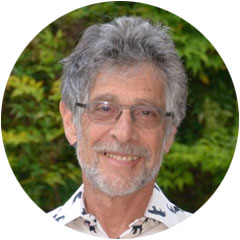
DON LIPMANSON
Finding himself far more interested in wild landscapes and the megafauna occupying them than his nascent academic career teaching political sociology at the University of Quebec, Don piled his few possessions into a VW camper and set out for Taos, NM in 1975. From a traditional adobe ranch house atop a lightly populated ridge top, he began observing the lifestyles of mule deer, the occasional pronghorn antelope and two apex predators – coyotes and bobcats – that coveted his flock of chickens.
The need to support a small family led Don to move to Tucson where he learned stained glass craftsmanship, then opening a glass studio near Tumacacori. Seeking greener landscapes after several years in the high desert, he and his family moved to a ridge top parcel in coastal Mendocino County and over the years developed it into a viable homestead.
The 1980’s saw an acceleration of what Don perceived as the terrible destruction of the North Coast’s forests and streams. Large corporations were cut and re-cutting the forestlands to which they held title, and spraying herbicides that he and fellow environmentalists suspected (and we now know) were carcinogens or endocrine disrupters. Clearcutting and fragmentation of local forests clearly were transforming the balance of fauna: deer that were near daily visitors when he first arrived became much less common, bobcats gave way to raccoons as the top predator of his chickens, black bears became orchard invaders as unsustainable levels of logging and stream obstruction undermined their customary food supplies of berries, roots and spent salmon.
Seeing profit-driven environmental abuses so close to his home drove Don to environmental activism, which included organizing a massive demonstration in front of Louisiana-Pacific’s regional headquarters in Ukiah to protest the company’s aerial spraying of herbicides, reviewing and opposing timber harvest plans, fighting against the poisoning of wildlife with Compound 1080 and opposing oil drilling along the Northern California Coast. In 1989, the Forests Forever campaign hired Don as statewide volunteer coordinator for Proposition 130, a citizen’s initiative aimed at prohibiting clearcutting and limiting logging on private forestlands across California, which fell just short of the majority required for passage.
By 1990, Don had come to believe that becoming a lawyer would enhance his ability to fight extractive industries’ merciless and never-ending assaults on the natural environment. He enrolled at John F. Kennedy School of Law in the East Bay and soon began clerking in the office of his criminal law professor. From the moment he received his bar card, local residents and Earth First!ers began soliciting him for pro bono defense to criminal charges of trespass or trumped up allegations of felony assault on officers during protest blockades. No defendant he represented in those cases ever received any additional time behind bars beyond their initial arrest.
In 2000, Don was appointed to the Mendocino County Planning Commission based on his history of environmental activism. For six years he opposed development plans – primarily for wineries and large rural subdivisions – he considered likely to damage forests or watercourses, to obstruct movement of herbivores and their predators, or require cutting of threatened oak species. The county’s Board of Supervisors also appointed him to the environmental representative seat on the regional working group that was tasked with devising rules to implement California’s Marine Life Protection Act along the North Coast.
After his second planning commission term expired, Don moved to Sonoma County, where he became a volunteer raptor handler at a bird rescue center, then a mentor to troubled teenagers at Sonoma Humane Society. He was active in promoting wolf recovery in California, testifying before federal and state hearing officers and commissioners, and periodically lobbying the local Congressman to preserve the Endangered Species Act. With wolves finally returning to California, Don looks forward to promoting Project Coyote’s goal of ending the mindless killing of apex predators (and even pet dogs) by wildlife agencies. His immediate focus is to help Project Coyote and its allies terminate Mendocino County’s antiquated “lethal control” contract with USDA Wildlife Services. Behind all these efforts lies his hope that such conservation efforts will allow him, his three grandchildren and the public at large to enjoy more frequent sightings of indigenous megafauna and birds throughout their historic ranges around the planet.
Podcast: Ecology Hour on KZYX
